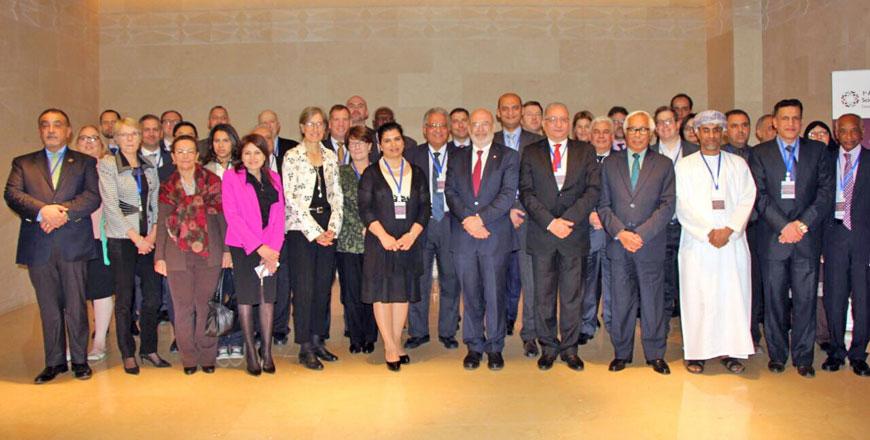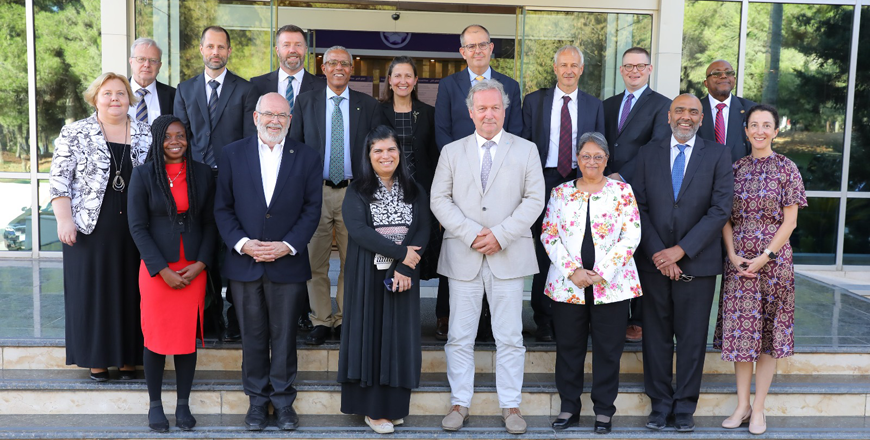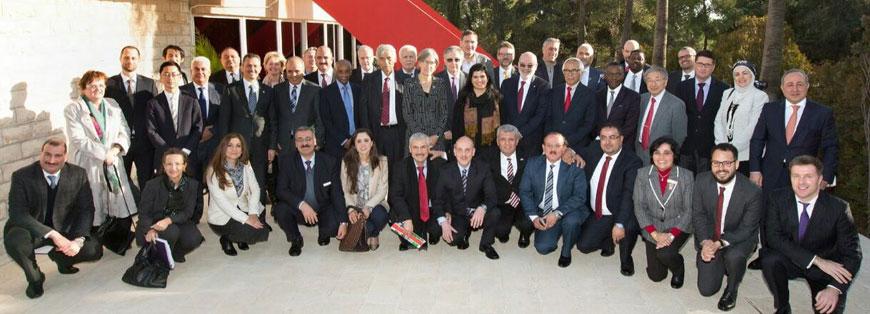You are here
Scientists, innovators discuss incorporating scientific advice into policymaking
By Dana Al Emam - Dec 14,2016 - Last updated at Dec 14,2016

HRH Princess Sumaya with participants in the first Arab Leadership Dialogue on Science Advice to Governments at the Dead Sea on Tuesday (Photo courtesy of CRDF Global)
DEAD SEA — Incorporating evidence-based scientific advice into sustainable policymaking helps in better addressing local and regional challenges as well as leveraging growth and prosperity, scientists and experts agreed.
Around 30 key regional scientists, technology leaders and innovators from the region and a number of international experts met on the eastern shores of the Dead Sea for the first Arab Leadership Dialogue on Science Advice to Governments, to discuss means of enhancing the scientific community’s contributions to official decision making.
The two-day event, which concluded on Wednesday, was organised by the Royal Scientific Society (RSS) and the UN ESCWA Technology Centre, in partnership with the International Network for Government Science Advice (INGSA) and CRDF Global.
The event sought to extend the dialogue on science, technology and innovation in the region, enlarge and strengthen the capacity and network of those interested in the improvement of science advice for policy, assist institutional development and regional cooperation, and seek regional input into the draft of Ethics and Principles of Science Advice to Government, according to the organisers.
Speaking at the opening ceremony on Tuesday, HRH Princess Sumaya, president of the RSS, said that embedding good science advice into policymaking must be an integral part of the evolving new social contract for communities and nations, all based on trust, equality and all-pervasive good governance.
Despite regional challenges, there is an emerging “new breed” of young students, early career scientists, researchers, civil servants and entrepreneurs, who were able to overcome obstacles of decades of slow institutional development, driven by an ambition to improve societies, she explained.
“With the help of initiatives like this, we will find a way to give younger and future generations a real stake in their nations and the world, by providing a mechanism for their growing wisdom, knowledge and curiosity to benefit communities, states and a region in transition,” she said.
Meanwhile Princess Sumaya highlighted a need for enhancing science literacy across all segments of society, as a society that teaches its people basic sciences will reap the rewards both in increased innovation and in good government.
“Politics will always have its say. But the more that nations, communities and constituencies are science-literate, the more likely it is that decisions based on good science will prevail,” she noted.
In addition to the need for scientists’ efforts to address emerging issues like refugees, there is also a need to scientifically plan for enhancing resilience and post war construction, said Fouad Murad, executive director of the UN ESCWA Technology Centre.
Murad added that enlisting the assistance of science, through knowledgeable advisers, efficient thinkers and effective advocates, helps in creating a stable, inclusive and sustainable future through informed and enlightened policies.
Acknowledging differences between approaches of the scientific and the political communities, Sir Peter Gluckman, chair of INGSA and chief science adviser to the prime minister of New Zealand, said the two have to work with each other and learn from each other to better address challenges.
He cited fields of migration, economy and national security as main fields of possible cooperation.
Mike Dignam, CEO and president of CRDF Global, which is an independent non-profit organisation that promotes scientific and technical collaboration, said the organisation has worked in the region through an office established in Jordan in 2010.
Since then, CRDF Global has engaged hundreds of scientists from the region in exchange programmes, conferences and workshops to work with other scientists around the world and break down barriers, he said.
Director General of the Islamic World Academy of Science Moneef Zoubi spoke about the historical development of science advice to government throughout Islamic history, highlighting Bait Al Hikma, established in the 8th century in Baghdad, as an early academy of science in the region that worked to advance sciences.
Participants also discussed a number of issues, including the current landscape for science advice in the Arab region and the role of science advice in addressing the Sustainable Development Goals. The convention also showcased a number of international case studies.
The event aimed to establish the grounds for a pan-Arab advice network that would serve as a platform to communicate and share best practices, address challenges and come up with solutions, according to organisers.
Related Articles
AMMAN — HRH Prince Hassan, Chairman of the Royal Scientific Society (RSS), on Wednesday met with delegates of the Steering Committee of the
AMMAN — HRH Princess Sumaya, the president of the Royal Scientific Society (RSS), on Tuesday welcomed leading international scientists and p
AMMAN — The Royal Scientific Society (RSS), in partnership with the Synchrotron-light for Experimental Science and Applications in the Middl

















